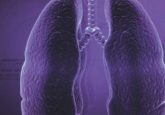Statins may be associated with reduced mortality in common cancers
Research presented at Frontiers in CardioVascular Biology 2016 (8–10 July, Florence, Italy) has demonstrated that after a 14-year study of nearly 1 million patients, diagnoses of high cholesterol were associated with improved survival rates in four common cancers: lung, breast, prostate and bowel cancers.
“The discovery of a link between obesity and high cholesterol as risk factors for cancer has been exciting for researchers and the public,” commented lead author Paul Carter (Aston University, Birmingham, UK), “Even trendier is the idea that if high cholesterol can cause cancer, then cholesterol lowering interventions such as statins could reduce this risk.”
Carter continued: “We previously found an association between having high cholesterol and developing breast cancer. Two animal studies show that giving statins for high cholesterol can reduce the risk of breast cancer. We wanted to see if there was any effect of high cholesterol on mortality amongst cancer patients.”
In the study, patients admitted to UK hospitals with lung, breast, prostate and bowel cancer were recruited from the Algorithm for Comorbidities, Associations, Length of stay and Mortality (ACALM) clinical database between 1 January 2000 and 31 March 2013. While the ACALM database also included information on existing patient conditions such as high cholesterol, mortality data was obtained from the Office for National Statistics.
Out of a total 929,552 patients who made up the study, 7997 had lung cancer, 5481 had breast cancer, 4629 had prostate cancer and 4570 had bowel cancer.
Researchers adjusted mortality-influencing factors such as age, gender, ethnicity and the ten most common causes of death in the UK to find that cancer patients that had diagnoses of high cholesterol displayed higher survival rates compared with patients that did not. This was observed across all four cancer types with a 22% reduced mortality risk in lung cancer patients, a 43% reduced risk in breast cancer patients, a 47% reduced risk in prostate cancer patients and a 30% lower risk in bowel cancer patients.
“Our research suggests that there’s something about having a high cholesterol diagnosis that improves survival and the extent to which it did that was quite striking in the four cancers studied. Based on previous research we think there’s a very strong possibility that statins are producing this effect,” concluded Carter, “Because we saw the association amongst all four cancers we studied, we think this effect is caused by medications used for high cholesterol such as statins. These findings are likely to be seen in other cancers as well but this is only speculation and would need to be confirmed by studies in different types of cancer.”
Senior author Rahul Potluri (ACALM Study Unit) stated: “Statins have some of the best mortality evidence amongst all cardiovascular medications and statin use in patients with a diagnosis of high cholesterol is possibly the main reason that this diagnosis appears to be protective against death in patients with lung, breast, prostate and bowel cancer. Other cardiovascular medications may also be protective and explain the varying levels of risk reduction in the four cancer types. For example, prostate cancer is associated with heart disease and these patients tend to take ACE inhibitors and beta-blockers.”
“The results of this study strengthen the argument for a clinical trial evaluating the possible protective effect of statins and other routinely used cardiovascular medications such as aspirin, blood pressure medications, beta-blockers and ACE inhibitors in patients with cancer. Whether it is statins and/or other cardiovascular drugs in combination that have an effect on mortality remains to be seen,” Potluri concluded: “Patients with cancer who are at high risk or have established cardiovascular disease should be given statins as per current guidelines. I don’t think at the moment we can give statins for cancer per se. But this could change if there was a positive result in the clinical trial.”





